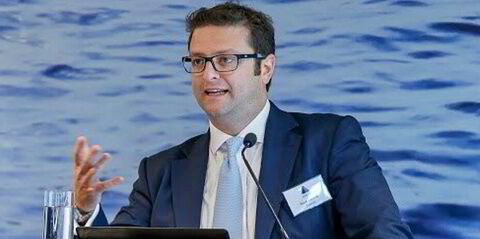Arguably a new level of awareness and determination emerged from the Shaping the Future of Shipping Summit last week on how to forge ahead with decarbonisation.
The International Chamber of Shipping (ICS) meeting in London, under Chatham House rules — so that views expressed could not be attributed publicly to speakers — went on longer than expected, with a wide range of differing opinions expressed that delayed an outright statement on the day.
But eventually, the ICS was able to agree on a form of words.
A pathway to decarbonisation would include establishing clean energy marine hubs comprising energy providers, ports and the shipping industry, and a new platform should be established to encourage collaboration across sectors to explore a framework that would include potential funding mechanisms for the research and development (R&D) of low/zero-carbon fuels and technologies.
But an off-the-record briefing illuminated several significant issues and approaches that emerged from the discussions.
First and foremost, it was clear that there was deep disappointment that the industry’s proposals to create an R&D fund for new and alternative technologies is dead in the water after being rejected by the International Maritime Organization’s Marine Environment Protection Committee meeting earlier in June.
The idea for a $5bn fund has been three years in the making and was first mooted five years ago. Clearly, there was a desire to ensure that effort was not wasted, and that a new way of setting up an industry-wide initiative was being sought.
And it was again obvious that the industry’s willingness to make practical commitments to go green is well in advance of the regulators’ political positioning.
Targets to cut emissions were not questioned. The desire was more to find ways to start making a difference within the next few months, perhaps with an eye on the upcoming Carbon Intensity Indicator regulations, as well as to achieve aims being set for 2025, 2030 and 2050.
The fact that some sectors of the industry, particularly the liner companies, have spare cash now to invest in cleaning up their operations was acknowledged alongside the fact that at least 60% of the world fleet is still owned by smaller operators that do not have the financial resources to undertake long, expensive R&D projects that might not have a successful outcome.
And therein remains one of the great challenges: there are no clear pathways yet to decarbonisation. Even accepting that there will be many ways of getting there does not mean the road ahead can be clearly mapped.
Questions raised included how to work with energy producers to ensure there are enough low-emission alternative fuels for shipping — let alone all the other industrial, aviation and domestic demand.
It is also far from sure how even some of the more advanced plans for making a quick start, such as the green corridors initiative that emerged at the COP26 climate talks last year, can be put into action.
Who defines a green corridor, what exactly are they and how are they set up, including the establishment of the necessary shoreside infrastructure for new fuel systems, are to an extent unknown.
The fact that nuclear power, written off in the past as too expensive or politically unacceptable, is back on the table for consideration underlines the uncertainty over how to push the agenda quickly forward.
But there is a definite awareness in the upper echelons of shipping these days that if international efforts to push decarbonisation are too slow, regional moves to impose rules or carbon pricing mechanisms will have to be accepted.
The industry seems ready to accept it will need to find ways to collaborate within and without to make progress and eventually hopefully see global structures created.
With that, though, is a concern that safety issues, such as ammonia — which, although one of the most promising hydrogen-bearing fuels for shipping, is a dangerously toxic chemical to handle — are kept at the forefront of developments.
Seafarers, as a result, will need to be more highly skilled and trained in the use of several types of fuel or propulsion systems than in the past. It could become a crisis finding enough people willing to be that workforce of the future.
The good news is that the ICS is serious about spearheading these efforts and it should be applauded for the progress it is making. The regulators might want to take note and respond in kind.






